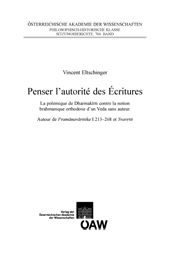
Vom buddhistischen Philosophen Dharmakīrti (ca. 600–660) sind sieben Werke im Großteil im originalen Sanskrit erhalten, die am meisten die Bereiche der Logik, der Erkenntnistheorie sowie auch der Buddhologie anbelangen. Das mit eigenem Prosakommentar (Svavṛtti) versehene Pramāṇavārttikam, das aus vier Kapiteln besteht, gilt als Dharmakīrti Frühwerk, und soll zweifellos auch als sein bedeutsamstes Werk betrachtet werden. Im ersten Kapitel des Pramāṇavārttikam widmet Dharmakīrti einen langen Exkurs dem Thema der Begründung der Überlieferungsautorität (āgamaprāmāṇya), in dem der berühmte indische Logiker seine eigene Auffassung der Autoritätsbegründung skizziert und in eine lange Auseinandersetzung mit der orthodoxen und ritualorientierten Schule der Mīmāṃsā eingeht. Dabei handelt es sich um eine verheerende Kritik der sogenannten Unverfasstheit (apauruṣeyetā) des Veda unter Betrachtung von vier Themen: angeblich naturgegebene Beziehung zwischen Wort und Gegenstand/Bedeutung (śabdārthasambandha), Ewigkeit der Vedarezitation (vedādhyayana), Unverfasstheit des „sphoṭa“ (gegen die Grammatiker) und der Phoneme (varṇa). Als Hauptteil bietet die Studie eine annotierte französische Übersetzung der Verse 213–268 sowie des angehörigen Eigenkommentars an. Diese Übersetzung wird soziohistorisch sowie ideengeschichtlich eingeführt, und mit verschiedenen Appendices versehen (unter denen eine kritische Edition der tibetischen Version der Passage). Die Studie hat auch zum Zweck, die Bedeutung Dharmakīrtis Werkes aus seinem historischen, ideologischen sowie auch institutionellen Kontext näher einzubetrachten.
…
Seven works by the Buddhist philosopher Dharmakīrti (ca. 600–660 CE) are still nearly completely extant in their original Sanskrit. For the most part they deal with logic, theories of perception and Buddhism. The Pramāṇavārttikam with its prose self-commentary (Svavṛtti), consisting of four chapters, is considered an early composition of Dharmakīrti and is without doubt his most important work. In the first chapter of the Pramāṇavārttikam, Dharmakīrti devotes himself to a long excursus concerning the substantiation of scriptural authority (āgamaprāmāṇya). Here the famous Indian logician presents his own thoughts and enters a long contestation with the orthodox and ritual-oriented Mīmāṃsā School. The main part of the present study is an annotated translation into French of the verses 213–268 and their respective commentary. The translation has been undertaken from a historical as well as intellectual perspective and includes several appendixes (among them a critical edition of the Tibetian version of the passage). This volume presents both the first translation of this section of the Pramāṇavārttikam into a Western language and a first fundamental discussion of the doctrines contained therein. The study also intends to appraise more closely the importance of Dharmakīrti's works from their historical and ideological as well as their traditional context.
2007,
978-3-7001-3782-5
652 Seiten,
22,5x15cm, broschiert